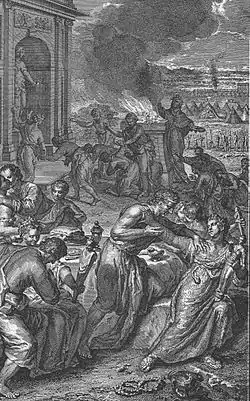Heresy of Peor
The heresy of Peor is an event related in the Torah at Numbers 25:1–15. Later biblical references to the event occur in Numbers 25:18 and 31:16, Deuteronomy 4:3, Joshua 22:17, Hosea 9:10; Psalm 106:28. New Testament references are found in 1 Corinthians 10:8 and Revelation 2:14.

In the Hebrew Bible
The story proceeds from that of the prophet Balaam, in which he ascends the mountain of Pe‘or, and makes sacrifices to God from atop it. Having finished his sacrifices, Balaam views the Israelites on the plain below, and although hired to curse them, pronounces a blessing over them, prophesying their blessed nature and destruction of Moab and the other adversaries of Israel.[1]
The Israelites, after spending a short time in the plain of Moab, begin to involve themselves with the Moabite women. Consequently, under the influence of Moabite culture, the Israelites begin participating in the worship of the Moabite gods, and join themselves to Baal Peor (Hebrew בעל פעור Ba‘al Pə‘ôr), in the Septuagint Beelphegōr, a baal associated with Mount Pe‘or.[2] Yahweh orders Moses to gather the chiefs of the people and hang up the idolaters before Yahweh to turn away Yahweh's anger.
The scene then abruptly shifts from concerns about Moabites to those about Midianites. A man — Israelite Zimri, the son of Salu — brings a Midianite woman Cozbi into the camp in the sight of Moses, where the people are weeping. Phinehas, grandson of Aaron, thereupon rises up with a spear, follows the man into a tent and thrusts the spear through both the man and woman. The plague, from which 24,000 had died, then stopped.[3] Because of his action, God then promises Phinehas a "covenant of peace" and a "covenant of eternal priesthood".[4]
God then commands Moses to wage a war of revenge against the Midianites.[5] However, the war is only launched several chapters later, in Numbers 31, with only virgin women being spared.